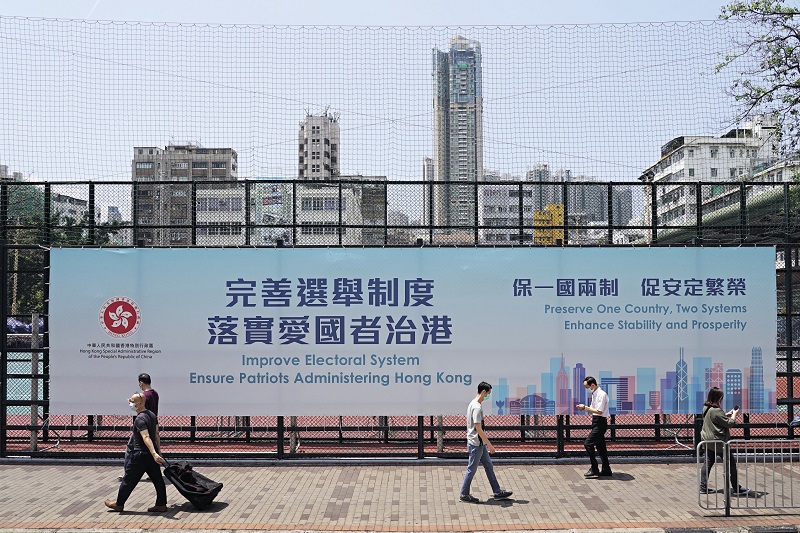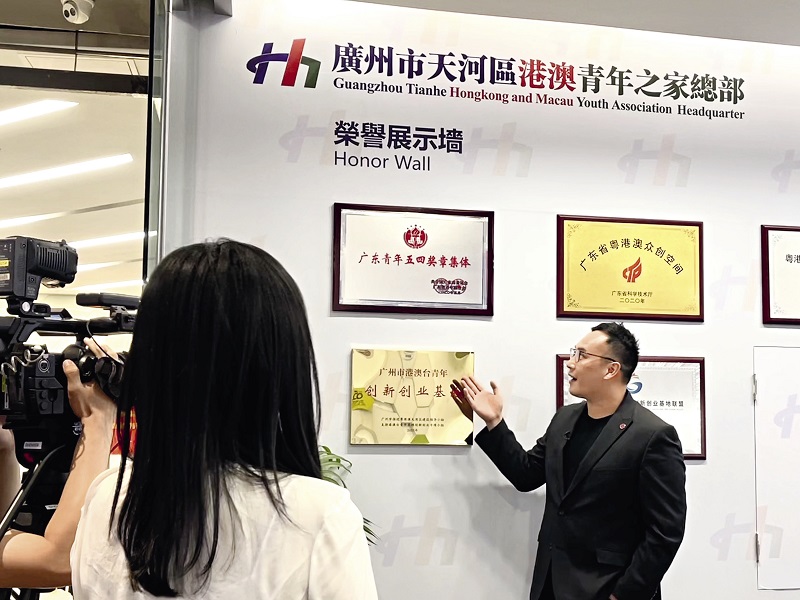China’s five-star red flag and the regional flag of Hong Kong Special Administrative Region (HKSAR) flew high over Golden Bauhinia Square, with the “Forever Blooming Bauhinia” golden sculpture glittering in the sunshine. It was a solemn occasion at the hall of the Hong Kong Convention and Exhibition Center, where the election of HKSAR’s sixth-term chief executive kicked off at 9:00 a.m. on May 8, 2022. Members of the Election Committee filed into the main polling station to cast their secret ballots on a one-person-one-vote basis.
Terence Chan was one of the 1,500 members of the Election Committee, and represented the sector of Hong Kong people on the mainland. He started a business in Guangzhou, capital city of south China’s Guangdong Province, and has benefited from preferential policies rolled out by the central and local governments at the Guangdong-Hong Kong-Macao Greater Bay Area.
A Solemn Vote
Born in 1988, Chan was born and raised in Hong Kong. Currently, he is working as the general manager of Guangzhou Tianhe Hong Kong and Macao Youth Association. He told China Today that to be a member of the Election Committee, he must be a competent representative of Hong Kong citizens from a specific sector. Chan represents Hong Kong youth chasing career development on the mainland. Although they spend most of their time on the mainland, this group of young people are concerned about every change in Hong Kong.
“It’s an important mission and I can feel the heavy responsibility on me,” said Chan. According to the new election system of the HKSAR, the Election Committee has been expanded with its members increasing from 1,200 to 1,500 in number. The expansion makes the committee broadly representative, relate to the actual situation of the HKSAR, and represent the overall interests of local society.
Chan’s sector was newly established by the current Election Committee, with a total of 27 members, including representatives from the branch offices of Hong Kong General Chamber of Commerce and the Hong Kong Federation of Trade Unions on the mainland.

“Patriots administering Hong Kong,” now a consensus among the Hong Kong citizens, can be seen posted on billboards along the streets of Hong Kong, on April 13, 2021.
Hong Kong has restored social stability after the the Law on Safeguarding National Security in Hong Kong took effect on June 30, 2020. “Patriots administering Hong Kong” is now the consensus of Hong Kong society.
Chan said that he read through every word of the 44-page election manifesto, featuring four broad tenets by the chief executive candidate John Lee, and Lee’s personal profile. What impressed him most was the top priority Lee put on “improving governance capabilities to tackle pressing livelihood issues.” Lee vowed to build a capable government with a “can-do” spirit, enhancing the comprehensive competitiveness of HKSAR and laying a solid foundation for its steady and sound development in the long run. Based on this, Chan cast his vote for John Lee, who won a landslide victory with 99.16 percent of the votes from the Election Committee members and elected as the sixth-term chief executive of the HKSAR. Lee takes office on July 1, 2022 after appointment by the central government.
This year coincides with the 25th anniversary of the establishment of HKSAR. Hong Kong people have very high expectations for the government under the leadership of the new chief executive. Meanwhile, Chan is looking forward to more preferential policies by the new government to support young entrepreneurs to seize the opportunities at the Greater Bay Area, giving full play to the institutional advantage of “one country, two systems” principle.
Integrating into National Development
“For Hong Kong youths born in the 1980s and 1990s, the central government’s initiative of accelerating the development of the Greater Bay Area as a whole has brought a golden opportunity,” said Chan. After graduating from the Chinese University of Hong Kong in 2012, he has been looking for a career path. In 2017, with the introduction of the development plan for urban agglomeration in the Greater Bay Area, he was keenly aware that the opportunity had arrived for him to align his personal goals with those of the nation’s.
Soon, Chan moved to Guangzhou, where he initiated the non-governmental organization – the Hong Kong and Macao Youth Entrepreneurship Service Center in the city’s bustling Tianhe District, together with other young Hong Kong entrepreneurs. “It focuses on helping Hong Kong youth to start their own businesses in Guangdong,” he said, adding that serving more young people has always been his dream.
Then in October 2019, Chan, with help from the Tianhe District Government, established the Guangzhou Tianhe Hong Kong and Macao Youth Association Headquarters. He is the general manager.
Different from the former organization, the latter is a business incubator, which operates under the guidance of local government. According to Chan, the incubator provides full-chain and one-stop services for young entrepreneurs in the Greater Bay Area, covering initial market development, company registration, bank accounts opening, tax filing, and employee recruitment. The services are provided free of charge.

Terence Chan (first, right) is showing the awards of the Guangzhou Tianhe Hong Kong and Macau Youth Association to visitors at the company’s headquarters.
Chan recalled that in 2018, Carrie Lam, the fifth-term chief executive of HKSAR, visited their service center in Tianhe District, and asked about the difficulties they encountered in life and work, giving her encouragement to the youth there. The HKSAR government then strengthened contact with them through the HKSAR government’s liaison office in Guangdong Province, giving them full support in handling routine procedures in enterprise operation and regular travels between Hong Kong and the mainland.
What was even more exciting was that the “Greater Bay Area Youth Employment Scheme” was written into the Chief Executive’s 2020 Policy Address, with the purpose of encouraging and supporting young people to work and pursue their career in mainland cities across the Greater Bay Area. The scheme was warmly welcomed by both young entrepreneurs in Hong Kong and newcomers on the mainland as they can have more high-caliber employees.
Chan also noticed that John Lee mentioned in his election manifesto that Hong Kong must proactively integrate into the national development, and find its position in the country’s dual circulation strategy, serving as a bridge that connects China and the rest of the world. Meanwhile, he encouraged the youth to tap employment and entrepreneurship opportunities in the Greater Bay Area, and owners of start-ups, small and medium-sized enterprises to expand their businesses and create more jobs there, sharing the gains from economic growth, whilst fulfilling their personal ideals.
These goals are what Chan is striving to achieve. “Since the establishment of our organization, we have taken the initiative to visit universities and institutions, such as the Hong Kong University of Science and Technology and City University of Macao, to promote cooperation and exchanges, and have received more than 10,000 visitors from Hong Kong and Macao. Meanwhile, we have arranged activities to introduce national policies, laws and regulations, and tax and fee cuts,” he said. Currently the organization has incubated more than 200 enterprises, many of which have obtained financing and have their market value hitting RMB 100 million.
A Vibrant City Cluster
A frequent traveler between Hong Kong and Guangdong in recent years, Chan strongly felt the convenience brought by the policy package in terms of housing, transportation, and medical care rolled out by local governments in the Greater Bay Area, which continues to attract more Hong Kong people to live in or do business in the region.
In China’s 14th Five-Year Plan (2021-2025), the central government reaffirmed its support for Hong Kong’s four existing centers of strength – international financial center, international shipping center, international trade center, and center for international legal and dispute resolution services in the Asia-Pacific region. It also pledged support for Hong Kong to build itself into an international aviation hub, international innovation and technology hub, regional intellectual property trading center, and hub for arts and cultural exchanges between China and the rest of the world. To achieve the goals, Hong Kong needs to forge closer ties with the mainland, amid efforts to jointly build a livable bay area, and diversify its economy to drive further development, said Chan.
“Convenient transportation and the free flow of various economic production factors, such as people, logistics, capital and data, are the key to robust economic growth,” Chan said and gave some examples. The 26-kilometer Hong Kong section of the Guangzhou-Shenzhen-Hong Kong high-speed rail was officially opened to traffic in September 2018. It now takes only 48 minutes from Hong Kong’s West Kowloon Station to Guangzhou South Station. In October the same year, the Hong Kong-Zhuhai-Macao Bridge was opened to traffic, making it easier for Hong Kong and Macao residents to reach Zhuhai in Guangdong.
The central government and local authorities are working to provide better social services for Hong Kong people living and working on the mainland. Nowadays, with a residence permit, those from Hong Kong, Macao and Taiwan can purchase a house across the nine cities in the Greater Bay Area, and get access to the same social services, including medical care and education, as local residents.
With Guangzhou as an example, the local government launched an initiative in May 2019, providing a preferential policy package for those from Hong Kong, Macao and Taiwan to travel, study, work, start a business and live in the southern metropolis.

Peter Peng (fourth, right) is appointed by the Tianhe District Government in Guangzhou as a communicator to convey information and knowledge about tax payments and reductions to other young entrepreneurs from Hong Kong and Macao, on May 17, 2022.
Peter Peng is a founder of Guangzhou-based B-Heart Media, a marketing communications company. He was among the first young entrepreneurs accommodated in Guangzhou’s apartments reserved for Hong Kong and Macao youth in 2019. He paid only one-third of the market price to rent one of the apartments, furnished and equipped with household appliances. It takes him merely half an hour to drive to his workplace. In addition, there are designated schools for entrepreneurs’ children, as well as preferential tax policies and government-guaranteed business loans.
The parent company of Peng’s business – Real Media International Co., Ltd. – is a diversified multinational conglomerate. “In recent years, we have developed a number of cultural and creative products themed with the Forbidden City, which are popular among young people in both Hong Kong and the mainland,” he said. In his view, Hong Kong boasts a diverse and unique culture in which the Chinese culture encounters and mingles with the Western one and thereby has great potential for cultural and creative industries. Meanwhile, the mainland has a huge market with massive opportunities, so he decided to ride on the wave of innovation and entrepreneurship in the Greater Bay Area.
In May, Peng was appointed by the Tianhe District Government as a communicator to convey information and knowledge about tax payments and reductions to young entrepreneurs like him. “In Hong Kong, companies only pay an integrated tax rate of 8.5 percent; but the tax system on the mainland is much more complicated. So, we have to make a thorough explanation on every item of the tax payment to newcomers,” said Peng.
It has been five years since Chan started a business in Guangzhou. Chan said that he gained even more than expected, becoming a post-graduate student at Peking University’s Guanghua School of Management. “I am keeping a close eye on the booming market,” said Chan, who also hopes to deepen his knowledge on the emerging industries and pass on valuable information to his peers in Hong Kong, enabling more young people to benefit from the policy dividends of the 14th Five-Year Plan, and the vibrant future of the Greater Bay Area.